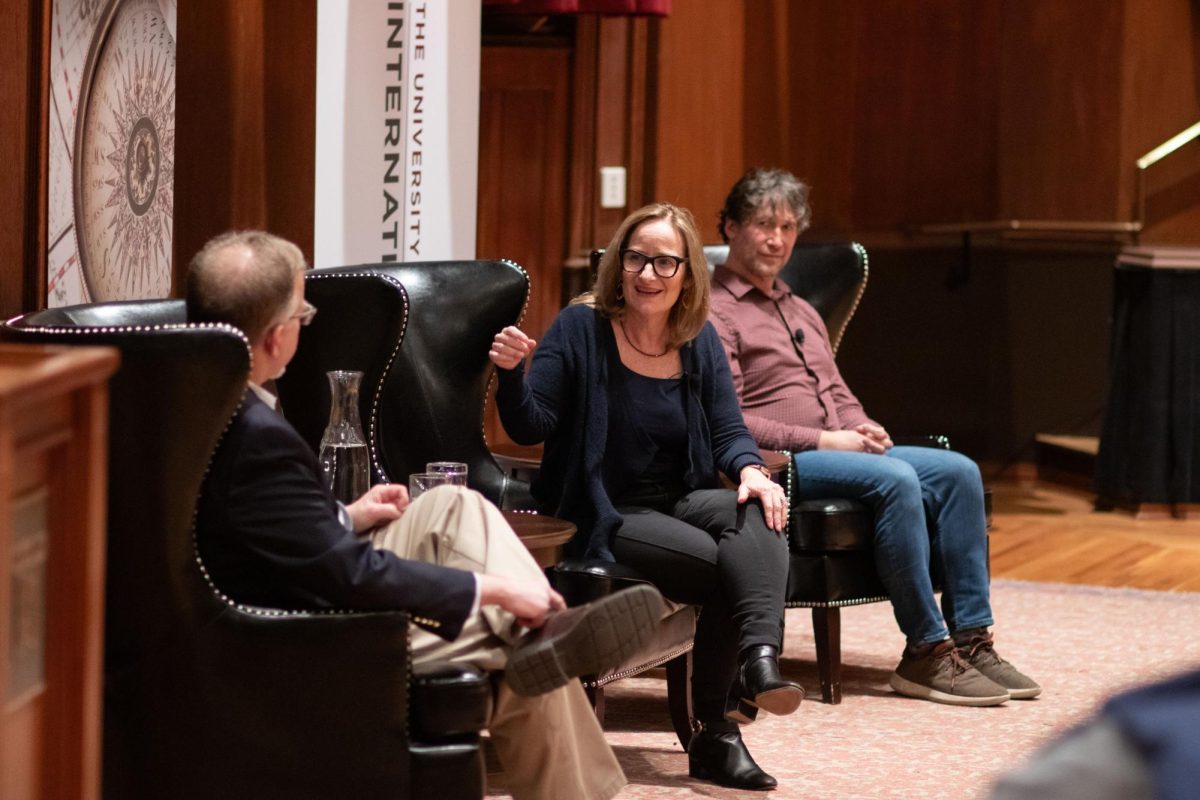Rachel Bronson, the president and chief executive officer of the Bulletin of the Atomic Scientists, and Daniel Holz, co-chair of the Bulletin’s Science and Security Board, discussed the organization’s famous Doomsday Clock and its recent maintenance at 90 seconds until midnight. Moderated by Chicago Sun-Times columnist Neil Steinberg, the discussion took place at International House on February 6.
Bronson began by discussing how the number of factors the Bulletin considers when determining a time for the Doomsday Clock has broadened since its inception in 1947. “Because we’re thinking about the political and ethical implications of science, we were early to declaring climate change an existential risk,” Bronson said. By including climate change, Bronson emphasized that the Bulletin now focuses on any existential threats that could arise from advancements in science and technology.
While the Bulletin sees climate change and nuclear weapons as the two main threats facing humanity in the present, Bronson asserted that new threats are bound to arise as time progresses.
“We have this bucket of disruptive technologies that we keep our eye on because they intersect—as Daniel says—as threat multipliers, but also to see what’s on the horizon,” Bronson said. She subsequently identified the Bulletin’s concern with biosecurity and artificial intelligence (AI). Although Bronson characterizes AI as having “the potential to be really dangerous,” she said that the board “is not yet convinced that it is an existential threat.”
Holz, who is also a professor in the departments of physics and astronomy and astrophysics, echoed Bronson’s analysis of AI, saying that, since there is a high level of uncertainty regarding AI’s true threat level, he does not see AI as a current existential threat. However, Holz asserted that the Bulletin sees misinformation and disinformation, which AI could exacerbate, as an existential threat.
“Some things aren’t clear. What the Bulletin has been worried about for many years is misinformation and disinformation, which we think of as an existential threat in the sense not that social media will wipe out all of humanity directly, but that social media amplifies messages that make it very hard to know what’s real.”
Addressing Steinberg’s question about the public’s reaction to this year’s Doomsday Clock announcement, Bronson hopes that the clock will serve to spark conversations about controversial subjects.
“I think [people] first of all [should] recognize the Doomsday Clock is an entrance ramp into various hard and complicated subjects that are designed to keep the public out,” she said. “It’s hard to talk about nuclear weapons and it’s hard to talk about AI… So the Doomsday clock becomes a conversation.”
Similar to how the Doomsday Clock is designed to start conversations, Holz praised the recent Oppenheimer movie for exemplifying the role the media can play in raising awareness of existential threats.
“There’s a lot more awareness of climate change, a lot more discussion, it’s really penetrated public awareness,” Holz said. “That’s the first step to getting political change, and so those messages are important. Oppenheimer has also… changed the conversation. And that’s important. And so the role of the media here is also critical.”
Bronson praised the Oppenheimer movie for raising awareness of the risk of nuclear weapons in a time when countries such as the United States and Russia are working to modernize their nuclear arsenals.
“We all know that things aren’t going in the right direction, and we are far from the Reagan/ Gorbachev view that a nuclear war cannot be won so therefore must never be fought,” Bronson said. “In fact, every major nuclear state is investing in nuclear weapons as if they are usable, and their military postures are mirroring that.”
Despite an increasingly concerning amount of global investment in nuclear weapons, Bronson commended global investments in renewable energy.
“We highlighted in the report the bright spot of the amount of funding that has gone into renewables this year,” she said, speaking of the 2024 Doomsday Clock Statement. “It was record-breaking. There were huge amounts of investment being invested in renewables across the globe. The challenge is that we’re still invest[ing] too much in fossil fuels, and we expect more to be coming online as the economies in the [global] south continue to industrialize.”
In terms of what ordinary people can do to actualize change, Holz encouraged the audience to exercise their political power through voting.
“Over half the world’s population is voting this year,” Holz said. “The outcomes of those votes can set the trajectories for our future, and so encouraging expressing your opinions about what directions you think are more positive is very important.”









